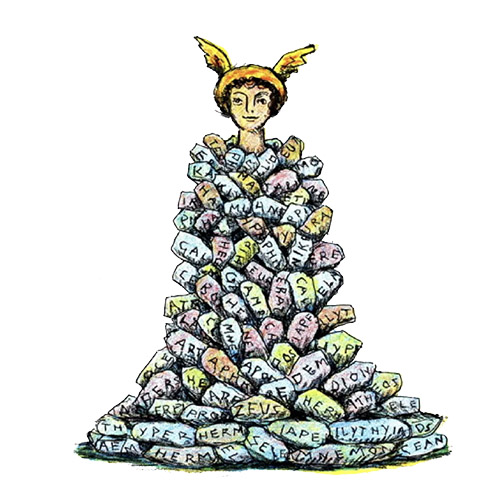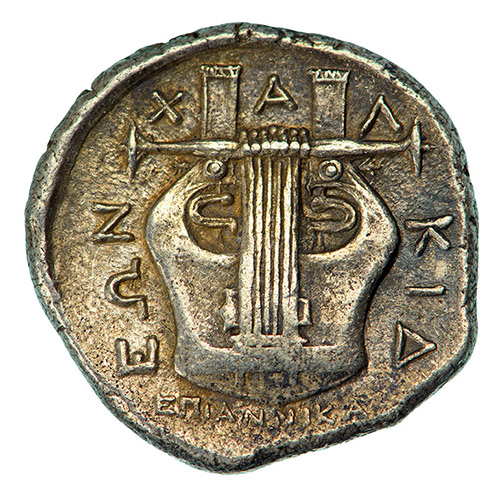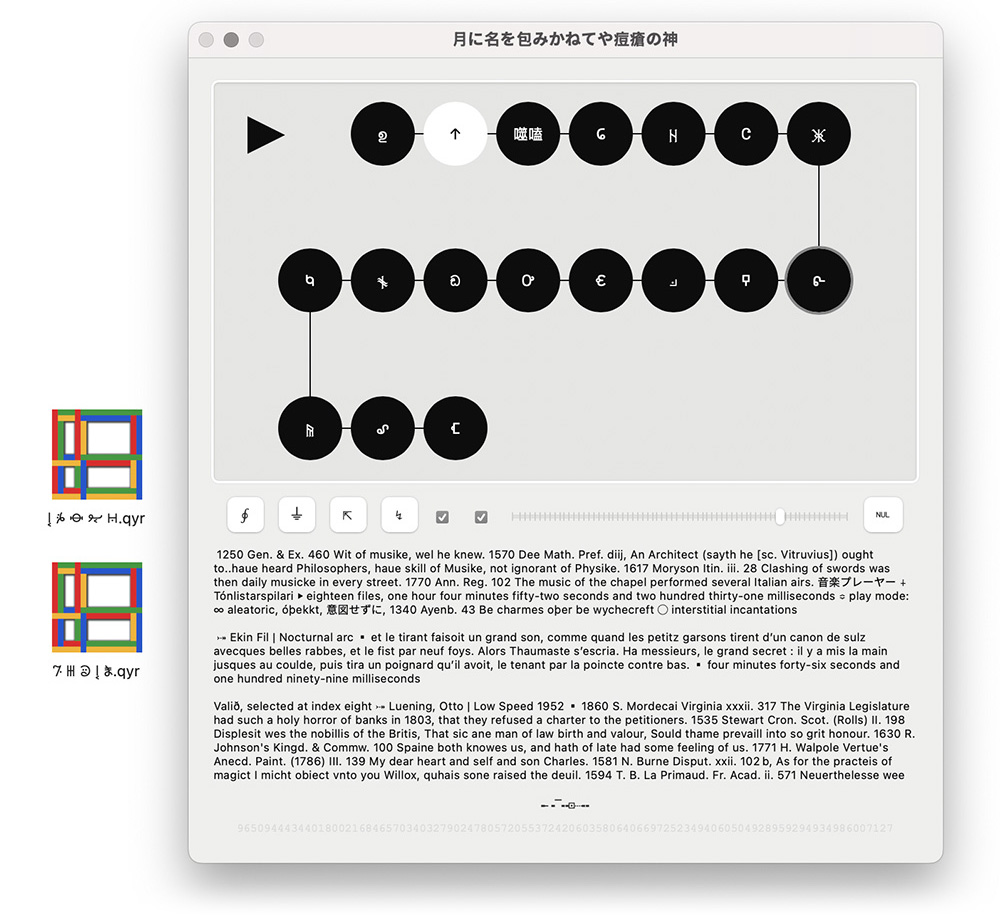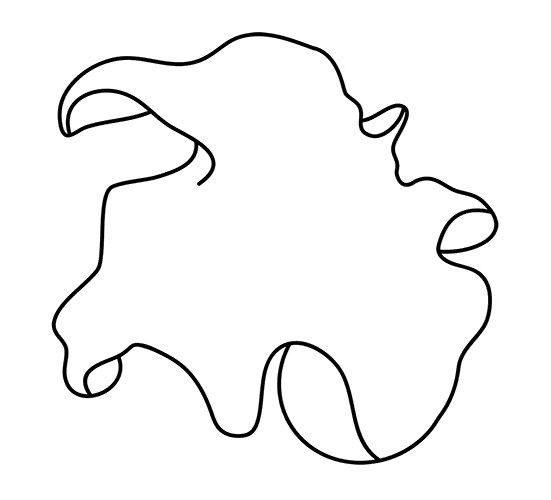Version 7 alpha ⤐ Swift/c rewrite build in progress. Improvements to convolution and mutation, MusicXML manuscript generator, audio player, and excellent renaming … see Hint menu for help, macOS 14+
⤐ Qyr ⁹⁹, Eviscerator Reanimator, A Subtle Despondence, Faltung in Zeit, La Femme 100 têtes, Noise ⌱ varietà infinita dei suoni-rumori, Quantitative Aggregation Blending, Équations du Chroma Colour Palette, Erratum Quantization, Gradients 画像のグラデーション, Complexité et multiplicité, Ibid. 343 Beowulf is min nama, Ὑφαίνειν music language extensibility markup, 1250 Owl & Night 1426 Thurh chirche bende, Mutacyouns of fortune fletyn with-owte, Печально, но факт ⤜⤛℘ В шоколаде, Oh fie, fie, ’tis an vnweeded Garden That growes to Seed, 1778 Learning at a Loss II. 11 Five thousand Instruments of Equestrian Utility … Tuesday July 1, 2025 1327
seven, a. and n. Forms: α. 1-2 seofon, -en, (1 seofan, -un, siofun, sibun, sifun, sufon, syfan, -on, 2 soven), 2-3 seoven, (Ormin se(o)ffne, se(o)fenn), 2, 5 sefen, 3 seovene, seofne, 3-5 sevene, 4 sefne, seyven, 4-5 seyvyn, sevon, sevyan, 4-6 sevin, -enne, ceven(e, -yn, 5-6 sevyne, 5-7 seaven, 6 sevn, 7 seavne, seivine, 3- seven. β. Chiefly Sc. 4 sewine, 5 sewne, 5-7 sewin, 6 seweyne, sewn, sawin. γ. 4 sen, sene (?); see also sennight. δ. 1 seofo, -a, siofo, sefo, 1-2 seofe, 2 sefe, 2-4 sove, 2-5 seve, 3 seove, 4 Kent. zeve, 5 sef(f.[Com. Teut.: OE. seofon (infl. seofone, -u, etc.) = OFris. sowen, sawen (later sân, saan, mod. saun), sigun, siugun (mod. sjûggen), etc., OS. siƀun, sivon (MLG. seven, soven, MDu. seven, Du. zeven), OHG. sibun (MHG. siben, G. sieben), ON. sjau (Icel. sjö, Norw. dial. sjau, sju, etc.; Sw. sju, Da. syv), Goth. sibun:—OTeut. *seƀun. The Indo-germanic *septṃ́ is more closely represented by Skr. saptá, Gr. ἑπτά, L. septem, OSl. sedmĭ, Lith. septynì, OIr. secht n-.] seven, a. and n. The cardinal number next after six, represented by the symbols 7, VII, vii. seven, a. and n. A. adj. seven, a. and n. • 1. a. In concord with a n. expressed. Beowulf 3122 “Þeᵹnas syfone.” 971: Blickl. Hom. 193 “An ᵹear & seofan monaþ.” 1000: Ælfric Gen. xli. 53 “Þa þa seofon godan ᵹear agane wæron.” 1175: Lamb. Hom. 13 “Þa oðre souen laȝe.” 1200: Ormin Ded. 252 “Godnessess seffne.” 1330: Arth. & Merl. 3845 “Þo seiȝe þai seuen baners.” 1390: Gower Conf. I. 140 “So that..he be bereined Be times sefne and sore peined.” 1440: Promp. Parv. 67/2 “Ceventymes, septies.” 1591: Digges Pantam. 8 “The line AB which I would diuide into seauen equall portions.” 1596: Dalrymple tr. Leslie’s Hist. Scot. I. 35 “Sax, sevin, or viii. cubites hich.” 1683: Evelyn Diary 18 June, “For the last seaven yeares.” 1813: Southey Nelson I. 198 “The capture of seven sail of the line.”
▪ Qyr ⁹⁹
A symple audio player sans distasteful features: downloading/uploading information, unwanted metadata crawl (especially the clumsy inconsistent record label spew associated with classical recordings), irritating album art … temptation of scrub and skip precluded.
Add audio files to playlist (∮), or drag and drop. Ninety-nine files maximum per playlist. Save playlist (⏚) (option file name), load playlist (⇱) or drag and drop, copy playlist files (↯). Format ‘.qyr’ is a text file format, and can be easily edited if one maintains the header.
Play modes: Sequential and Aleatoric, playlist looping ∞, interstitial vignettes ◯.
Spacebar pause/resume, arrow right and down to advance focus through the playlist, arrow left and up retreat, return plays/restarts a selected file. Drag a file circle icon onto the triangle play icon to play/restart the file and to reset the aleatoric order of the playlist.
Reorder files by dragging the file circle icon onto an unselected file.
Clear all files (NUL).
playing, vbl. n. [f. play v. + -ing 1.] playing, vbl. n. 1. a. The action of the verb play, in various senses. 1310: in Wright Lyric P. xxx. 88 “As y me wende omy pleyȝyng, on mi folie y thohte.” 1320: Sir Tristr. 1744 “Sche þouȝt..Tristrem and y boaþe Beþ schent for our playing.” 1420: Chron. Vilod ccxx, “Edgar rode ouȝt on his pleyeng, In to a fforest neyȝt to his place.” 1535: Coverdale Ecclus. xlix. 1 “Swete as hony.., and as the playenge of Musick.” 1561: T. Hoby tr. Castiglione’s Courtyer i. (1577) Cvb, “Some in ryding, some in playing at fence.” 1601: Bp. W. Barlow Serm. Paules Crosse 60 “They call it the playeing of the Bit in the horse mouth.” 1691: T. H[ale] Acc. New Invent. p. lxiii, “A playing of the Tide too and fro.” 1711: in 10th Rep. Hist. MSS. Comm. App. v. 148 “The action..mostly consisted in the playeing of the artillery.” 1712: J. James tr. Le Blond’s Gardening 193 “Conveying the Water..for the playing of Jets.” 1885: Athenæum 14 Nov. 645/2 “First-class orchestral playing.”
Argeïphontes Lyre is a set of Creative DSP filters, generators, and synthesis techniques for audio, video and text files on the macOS platform. Recombination, Mutation, Distortion, Symmetries, and Strange Attractors. Chaotic implementations of various contradistinctive arithmetic branches: ambition, distraction, uglification, and derision. macOS 10.13+
1340 Ayenbite 22 Fole wylninge, þet me clepeþ ine clergie ambicion, þet is kuead wilninge heȝe to cliue. 1449 R. Pecock Repressor 323 Vicis..as pride, ambicioun, vein glorie. 1593 T. Nashe Christs Teares f. 40 Ambition is any puft vp greedy humour of honour or preferment. 1581 R. Mulcaster Positions xli. 250 The distraction of temporall, ciuill, and Canon lawe being in many pointes very offensiue to our countrey. 1647 W. Lilly Christian Astrol. clvi. 648 ♂ in the seventh in ferall Signes, argues death by Distraction, or by Ruine, or fall of Timber or Houses. 1820 P. B. Shelley Œdipus Tyrannus i. 27 Where, for more glory, let the ceremony Take place of the uglification of the Queen. 1400 Cov. Myst. (Shaks. Soc.) 191 Of thi wurdys I have skorne and derysone. 1483 W. Caxton tr. A. Chartier Curial sig. iv That shold be a grete lesynge and worthy of derysion. 1600 W. Shakespeare Midsummer Night’s Dream iii. ii. 123 Scorne, and derision, neuer come in teares.
Audio filters: Sinuosus (sine/square/sine wave cycle generator with draw function define, equal temperament and microtonal tunings), Asteriscum (ring modulation), Faltung In Zeit (convolution with a time domain aspect), Yggdrasil raíces (polyphonic vector wavestacking note constructor, somewhat chaotic), Time Domain Erosion (erosive distortion physical modeling), A Subtle Despondence (granulated time domain phase distortion), Dynamic State Veryabyll (second order filtering), Loplop et la Belle Jardinière (continuous recombination with various time/frequency effects), la poquito Translocación Binaural (stereo positioning with draw function define), Sleightes sorting and shuffling (Blumlein delta algorithm stereo shuffling), Wrought of sterres bryht (mean amplitude displacement), Baktunkatuntunuinalkin (20 x 20 matrix delay with oblivion modeling), Eviscerator Reanimator (procedural recombination, granular resynthesis, segmentation), Time Domain Mutation (genetic algorithm recombination), The Lobster Quadrille (realtime recombination with various time/frequency domain effects), Widscriðel Scrythylle (wave cycle distortion with crest/trough shaping), Concatenate (file concatenation utility), Ouroboros (file looping), Kinbakubi (algorithmic thread layering with time domain effects), Noise (tunable noise generator)
Image filters: Animated by the winding of horns • (graphical representation of audio), Kinetograph and Kinetoscope (images to video), Symmetries Seventeen (symmetry generator based on crystallographic groups), L’attraction étrange (image/video generator based on chaotic math trigonometry), Area = π r² Generalization (monochrome spatial data generalization), Blocks Circles * (layered data generalization)
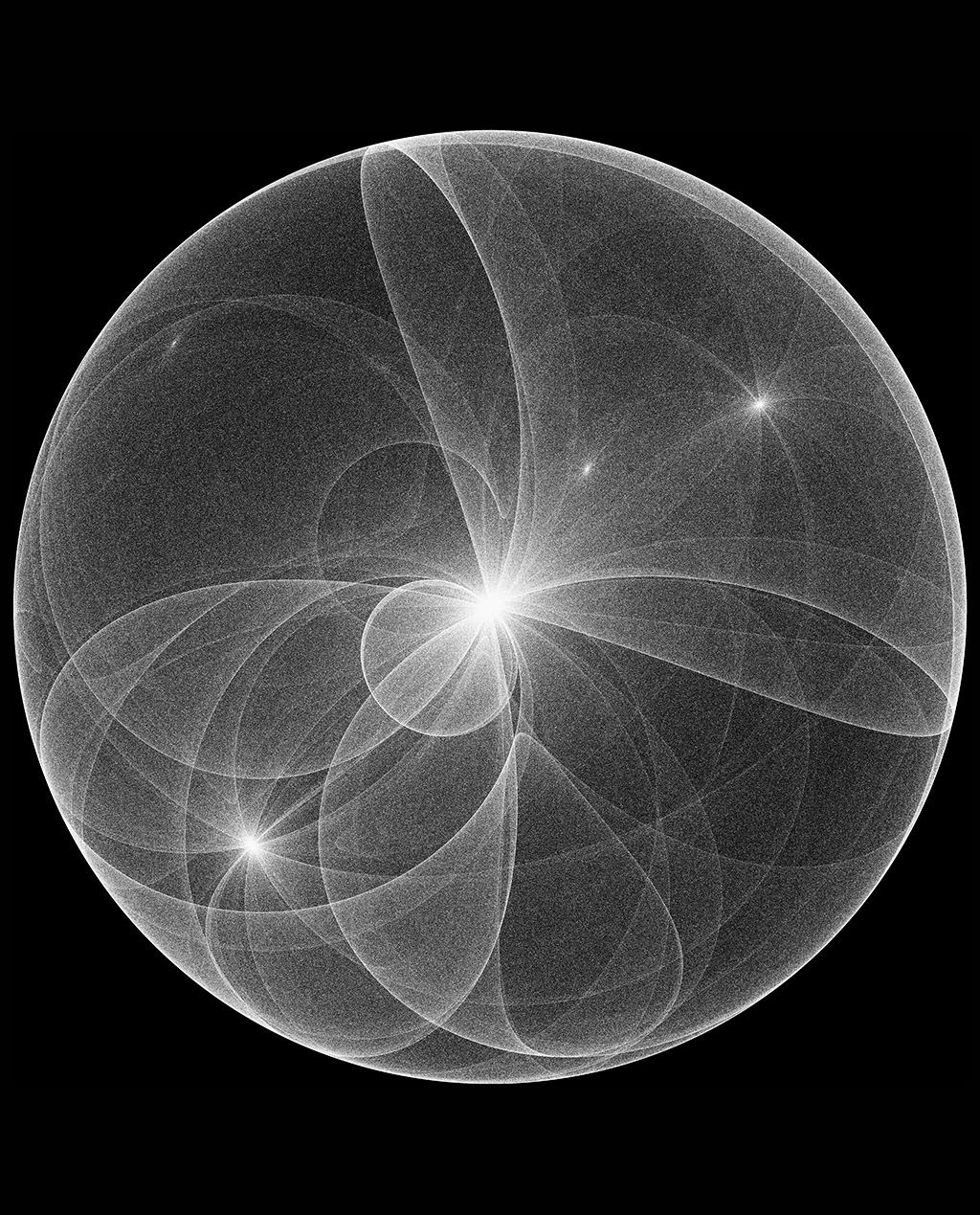
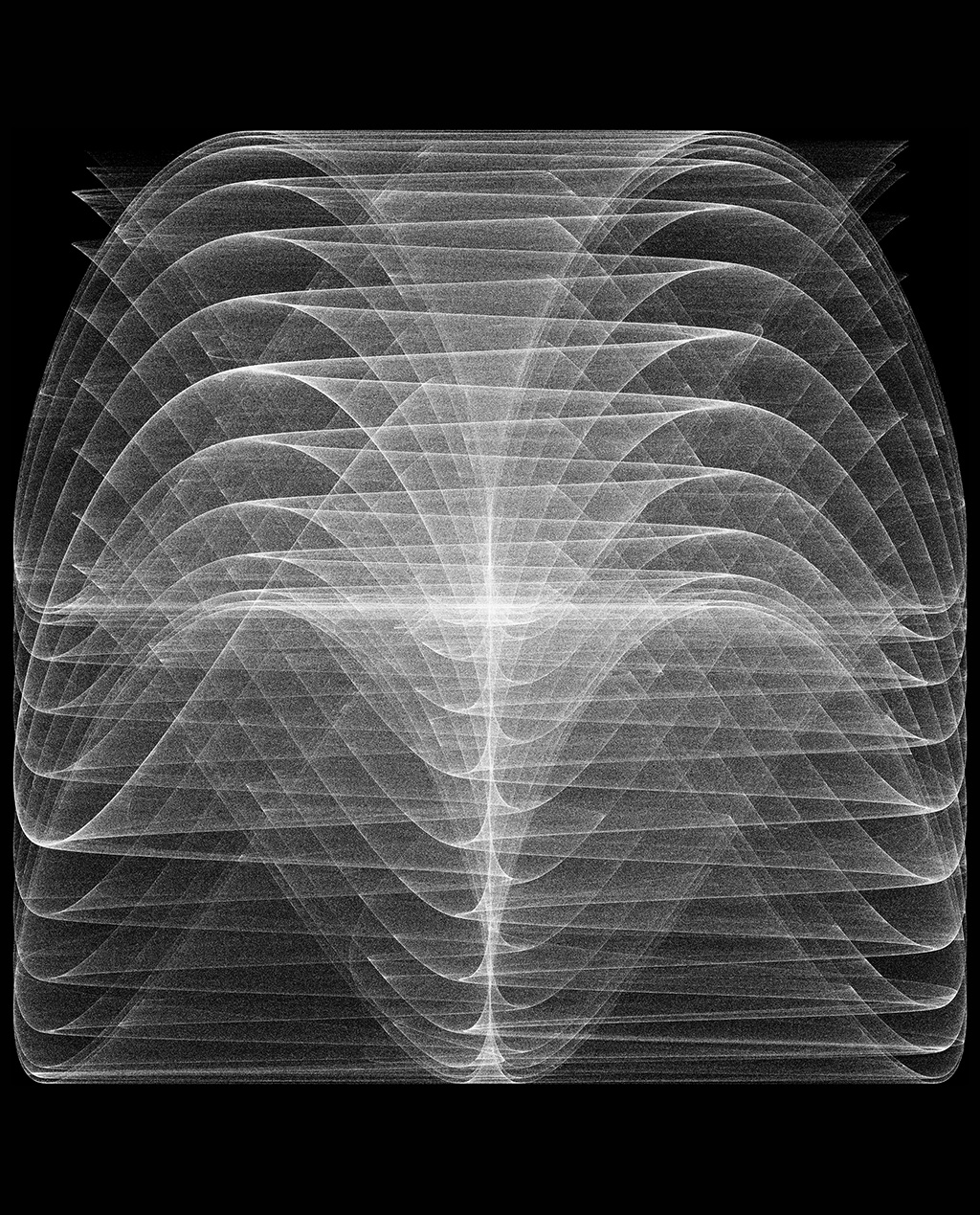
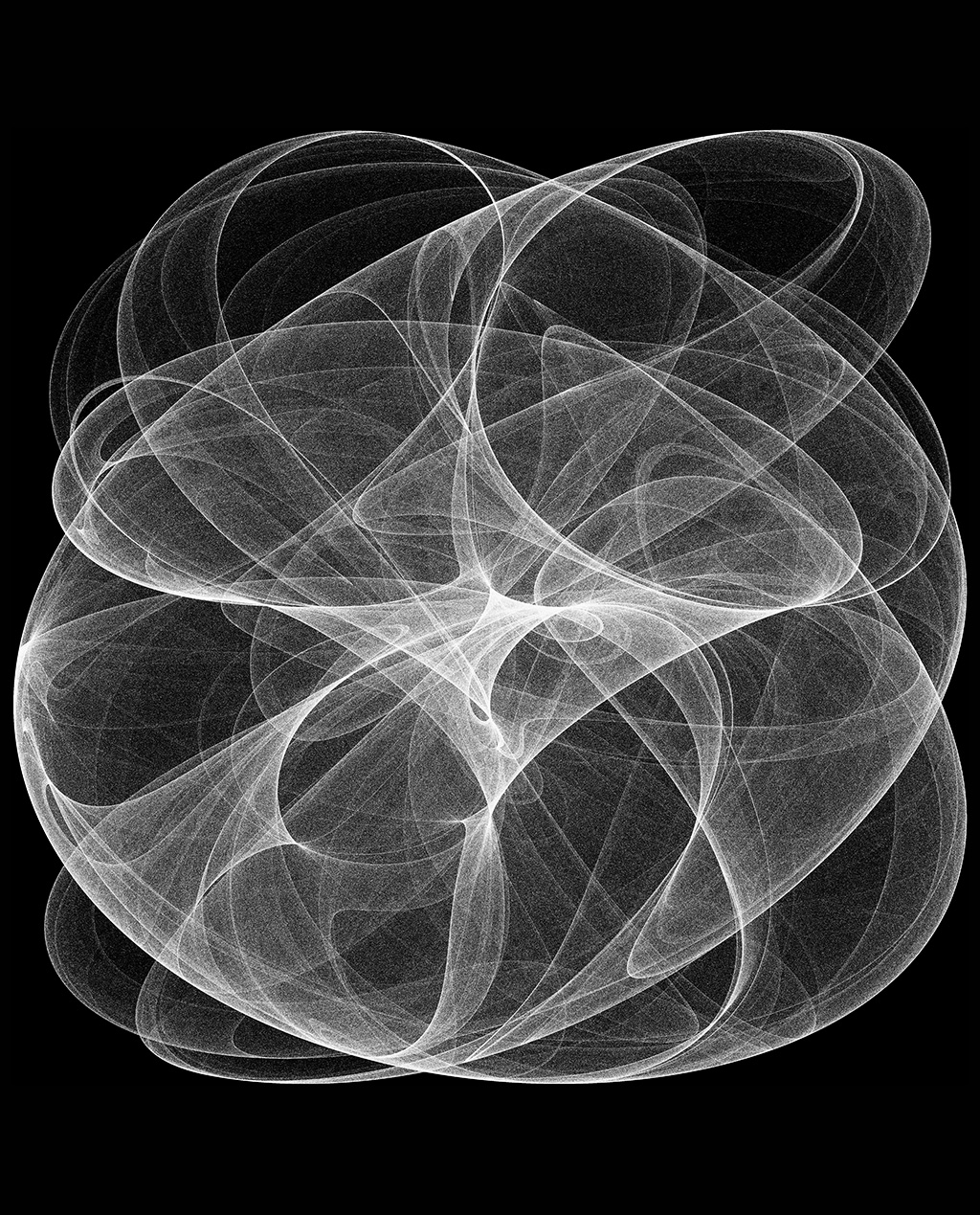
Text filters: Mutacyouns of fortune fletyn with-owte (genetic algorithm recombination), Signing for Soul and Body, set to them my name (file renaming), Oh fie, fie, ’tis an vnweeded Garden That growes to Seed (algorithmic text seed generation), Exit pursued by a Beare * (casual Shakespeare game)
Argeïphontes Lyre is free, caveat emptor, quia ignorare non debuit quod jus alienum emit, please use with discretion. (eOE tr. Bede Eccl. Hist. (Tanner) iv. xiii. 292 Seo ær hire þeowa hondum þyder gelæded wæs, heo þa freo on hire fota gongum [L. libero pedum incessu] bliðe ham hweorfende wæs. 1325 Gen. & Exod. (1968) l. 623 He [sc. Noah] and hise wif wenten ut fre. 1400 Cursor Mundi (Vesp.) l. 13079 (MED) Þe king þam lete haf fre entre [sc. to the prison]. 1384 Bible (Wycliffite, E.V.) (Douce 369(2)) (1850) 1 Cor. xii. 10 To anothir..is ȝouun..discrescioun [L. discretio], or verrey knowynge, of spiritis. 1450 H. Lovelich Hist. Holy Grail xxxii. 308 (MED) Now schal I tellen the my Resoun As Cometh to myn ȝonge discressioun, For I nam but ȝong, and litel of wyt.) Enregistrement du logiciel, hugbúnaðarskráning, ce n’est pas pour tout le monde…
* fang mich doch du eierloch
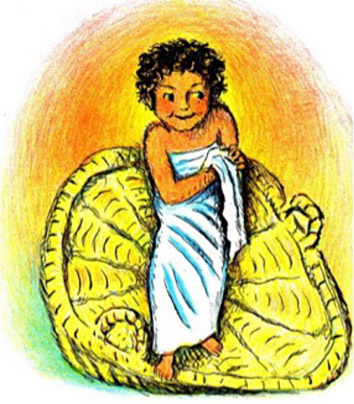
Hermes, merriest of the Olympians, was the god of shepherds, travelers, merchants, thieves, and all others who lived by their wits. His mother Maia, a Titan’s daughter, lived in a cave on lofty Mount Cylkne, a cave so deep that Hera never knew that Maia was one of Zeus, wives. Maia had therefore borne her son Hermes in peace. Hermes was very precocious, even fora god. His mother had hardly wrapped him and put him into a basket when he began to think of mischief.
As soon as she had fallen asleep, he wriggled out of his wrappings and tiptoed out of the cave. In the dark of night he toddled straight to the pasture where Apollo kept a large herd of white cows. Apollo liked music better than cows and he did not even notice that Hermes stole into the pasture and picked out the fifty best cows. To keep Apollo from knowing who had stolen his herd and which way they had been driven, Hermes slyly wrapped the hoofs of the cows with bark to disguise their prints, and tied brooms to their tails so they would erase their own tracks.
To confuse Apollo even further, he drove the cows backward out of the pasture, and tied bundles of branches to his own little feet so it looked as if a giant had led something into the pasture, but nothing out. He hurried home to Mount Cyllene and hid the stolen cows in a grove. Two of them he sacrificed to the twelve Olympian god, not forgetting to include himself as the twelfth! Then he took the entrails of the sacrificed cows, made seven strings of them, and strung them tautly across an empty tortoise shell. When he plucked the strings, they made lovely music. He had invented the first Lyre.
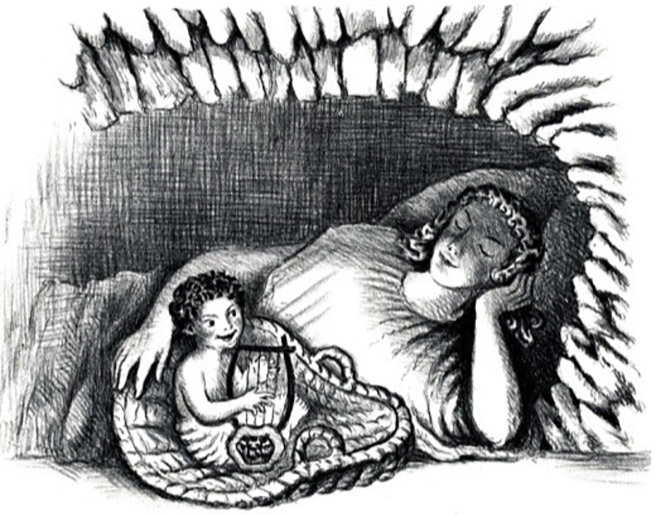
Pleased with himself, he hid the lyre under his arm and tiptoed back into the cave. He climbed into his basket, closed his eyes, and pretended to be sound asleep, but he did not fool his mother. She knew what he had been up to.
“Shame on you,” she said, “sneaking out at night and stealing Apollo, cows.” “Why, Mother!” said Hermes. “I did what I had to do for you and for me. We don’t want to live in this dark cave forever. Soon I will be seated on high Olympus as one of the twelve great gods, and you too will live there in glory as my mother.” Then he pulled out his lyre and played his mother to sleep with a lullaby.
At dawn Apollo stormed into the cave where Hermes lay in his basket pretending to be asleep. But Apollo wasn’t fooled. An oracle had told him who had stolen his herd, and he jerked little Hermes out of his crib and commanded him to return the cows at once.
“How could I have stolen your cows,” Hermes whimpered, “I am only a newborn babe. I don’t even know what a cow is. Look for yourself and you can see that there is not a single cow hidden in this cave.” “You are not only a thief but a liar as well,” raged Apollo, and chased Hermes out of the cave and straight up to Olympus.
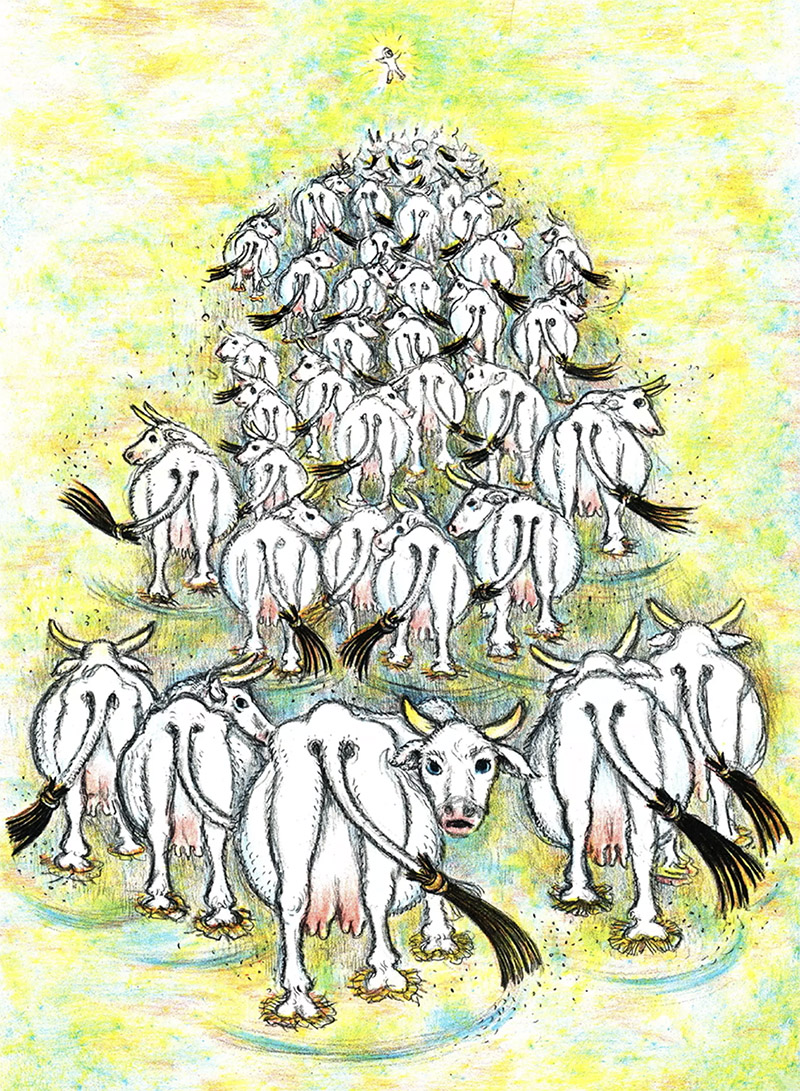
All the gods burst out laughing when they saw innocent-looking little Hermes running with furious Apollo at his heels. “Tell this thief and liar to give me back my cows at once,” said Apollo to their father, Zeus. “Tell my big brother to stop bullying me. I am a newborn and helpless infant. And I am not a liar,” said Hermes. “There isn’t a cow in my mother, cave.” “If they are not in the cave, then show Apollo where they are,” said Zeus, and hid a smile in his beard. He was proud of both his sons and wanted them to be friends.
Hermes had to obey his father, and without any more tricks he led his brother to the woods where the cows were hidden. Apollo forgave him, but when he counted his cows and found that two were missing, his anger flared again. Hermes had expected this and quickly pulled out his lyre and began to play. Apollo listened spellbound to the beautiful sounds from the new musical instrument, and he quite forgot his anger.
As the god of music, he must have the lyre and he offered Hermes his whole herd in exchange for the instrument. Hermes drove a hard bargain and Apollo had to give him his magic wand as well. From then on the two brothers were the best of friends.
Never again did Hermes steal, though he was the god of thieves. He never told a lie, but he didn’t always tell the whole truth. His mother, Maia, had no further reasons to be ashamed of him. As the mother of one of the twelve great Olympians, she moved up with him to the glory of Olympus.
Hera, the beautiful queen of Olympus, was a very jealous wife. Even Zeus, who was afraid of nothing, feared her fits of temper. She hated all his other wives, and when Zeus first asked her to be his wife, she refused. Slyly Zeus created a thunderstorm, changed himself into a little cuckoo, and, pretending to be in distress, he flew into Hera, arms for protection. She pitied the wet little bird and hugged it close to keep it warm, but all of a sudden she found herself holding mighty Zeus in her arms instead of the bird.
Thus Zeus won Hera and all nature burst into bloom for their wedding. Mother Earth gave the bride a little apple tree that bore golden apples of immortality. Hera treasured the tree and planted it in the garden of the Hesperides, her secret garden far to the west. She put a hundred headed dragon under the tree to guard the apples and ordered the three Nymphs of the Hesperides to water and care for the tree.
Zeus loved Hera dearly, but he was also very fond of rocky Greece. He often sneaked down to earth in disguise to marry mortal girls. The more wives he had, the more children he would have, and all the better for Greece! All his children would inherit some of his greatness and become great heroes and rulers. But Hera in her jealous rage tormented his other wives and children, and even Zeus was powerless to stop her. She knew how tricky Zeus could be and kept very close watch over him.
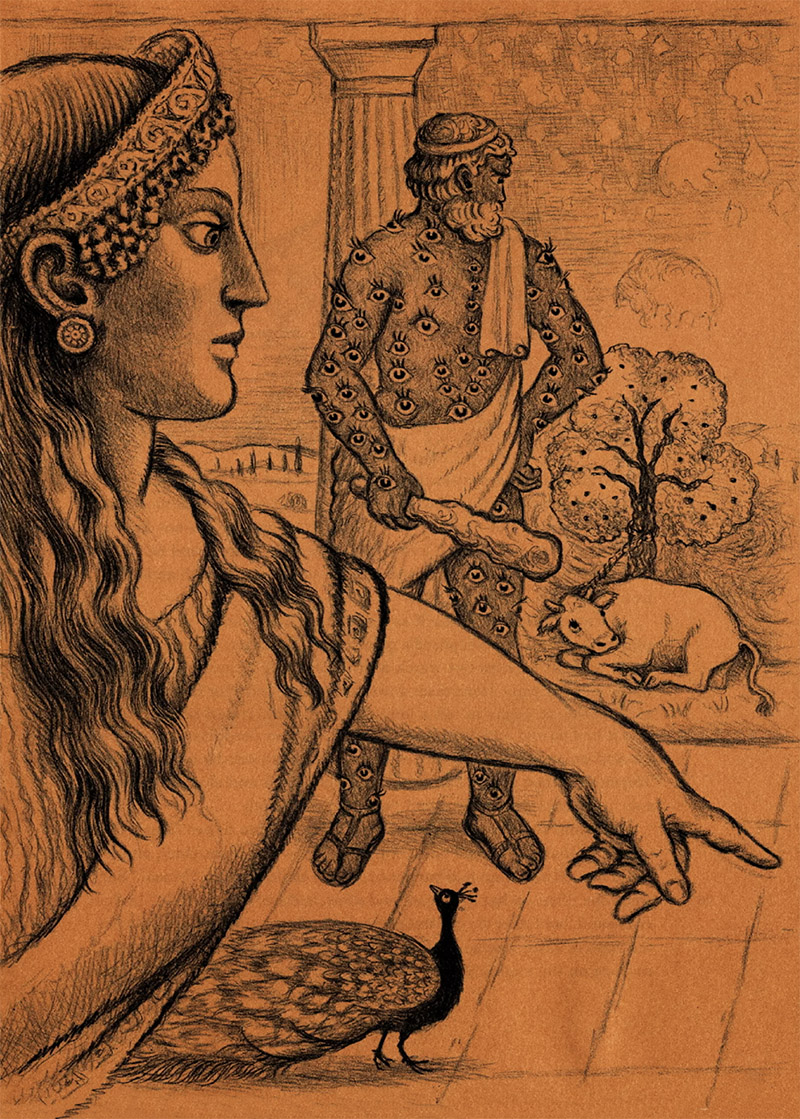
One day as Hera looked down on earth, she spied a small dark thundercloud where no cloud should have been. She rushed down and darted into the cloud. Zeus was there just as she had suspected, but with him was only a little snow-white cow. He had seen Hera coming and, to protect his newest bride Io from her wrath, he had changed the girl into a cow. Alas! The cow was as lovely as the girl, and Hera was not deceived, but she pretended to suspect nothing and begged Zeus to let her have the dainty cow. Zeus could not well refuse his queen such a little wish without giving himself away, and he had to give her the cow. Hera tied poor Io to a tree and sent her servant Argus to keep watch over her.
Argus had a hundred bright eyes placed all over his body. He was so big and strong that singlehandedly he had made an end to the monstrous Echidna, who had lived in a cave and had devoured all who passed by. He was Hera’s, faithful servant and the best of watchmen, for he never closed more than half of his eyes in sleep at a time.
Argus sat down next to the cow and watched her with all his eyes, and poor Io had to walk on four legs and eat grass. She raised her mournful eyes to Olympus, but Zeus was so afraid of Hera that he did not dare to help her. At last he could no longer bear to see her distress, and he asked his son Hermes, the craftiest of the gods, to run down to earth and set Io free.
Hermes disguised himself as a shepherd and walked up to Argus playing a tune on his shepherd’s pipe. Argus was bored, having nothing to do with all his eyes but watch a little cow, and he was glad to have music and company. Hermes sat down beside him, and after he had played for a while, he began to tell a long and dull story. It had no beginning and it had no end and fifty of Argus’s eyes closed in sleep. Hermes droned on and on and slowly the fifty other eyes fell shut, one by one. Quickly Hermes touched all the eyes with his magic wand and closed them forever in eternal sleep. Argus had been bored to death, and Hermes gained the epithet Argeïphontes.
Hermes then untied the cow, and Io ran home to her father, the river-god Inachos. He did not recognize the cow as his daughter, and Io could not tell him what had happened, all she could say was, “Moooooo!” But when she lifted up her little hoof and scratched her name, “I-O,” in the river sand, her father at once understood what had happened, for he knew the ways of Zeus. Inachos rose out of his river bed and rushed off to take revenge on the mighty thunder-god. He flew at Zeus in such a rage that to save himself Zeus had to throw a thunderbolt, and ever since the bed of the river Inachos in Arcadia has been dry.

Hera was furious when she saw that Argus was dead and the cow Io had been set free. She sent a vicious gadfly to sting and chase the cow. To be sure that her faithful servant Argus would never be forgotten, she took his hundred bright eyes and put them on the tail of the peacock, her favorite bird. The eyes could no longer see, but they looked gorgeous, and that went to the peacock’s little head, and made it the vainest of all animals.
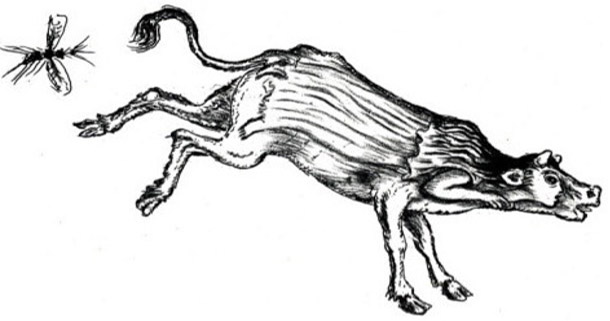
Pursued by the gadfly, Io ran all over Greece. Trying to escape from its tormenting sting, she jumped across the strait that separates Europe from Asia Minor, and ever since it has been called the Bosporus, the “cow ford.”
But still the gadfly chased her all the way to the land of Egypt. When the Egyptians saw the snow-white cow, they fell to their knees and worshiped her. She became an Egyptian goddess, and Hera now permitted Zeus to change her back to her human shape. But first he had to promise never to look at Io again.
Io lived long as the goddess-queen of Egypt, and the son she bore to Zeus became king after her. Her descendants returned to Greece as great kings and beautiful queens. Poor Io’s sufferings had not all been in vain.
